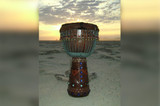Fife and Drum and Medieval Tabor Drums
The connection between drums and the military is as old as war itself. In cultures across the world, drums have served as a means of communication over long distances, whether between tribes or rallying troops into battle. This history, while not always illustrious, has become a mainstay of many festivals and celebrations today, where drums are used in parades or other groups in order to reenact the function, beauty and historical significance of drums.
The Medieval Tabor is one of the drums that may be best known for its presence during battles. Along with a small, flute-like instrument, the “Fife and Drum” were combined in order to help execute military maneuvers, as well as play morale-boosting music for troops from the 16th century through the late 18th century. Both instruments were played by one person, illustrating a level of skill and dexterity that can confound even the most brilliant modern musicians. Today, the Fife and Drum Corps tradition continues with the Old Guard Fife and Drum Corps, a 69-member, competitive Army band stationed at Fort Myer, VA.
Tabor drums are two-headed, rope-tuned snare drums, played with a stick or mallet while the drum hangs from the forearm. The original shell for these drums was made from heavy wood, but with improvements over time, tabor drums were eventually manufactured from tin, and are now typically made from lightweight laminates. Since Tabor drums are found in many different cultures, the sizes and styles can vary, bringing an abundance of sound to the overall rhythms played.
While a Fife and Drum corps unit or band is typically seen only in parades, political events and at festivals, the historical significance of these instruments is not only a lesson in the military use of instruments, but also in music and rhythm itself. With the diverse range of sounds, styles and historical influence, Tabor drums have a unique place in the evolution of drums, music and within the tactical role of military installations around the world.
Recent Posts
-
What is the Best Size Djembe for Beginners?
If you're new to the world of percussion and interested in learning the djembe, you're in for a t …16th Jul 2024 -
The Benefits of Becoming a Drumming Teacher: Transforming Passion into Profession
Why become a drumming teacher? Becoming a drumming teacher is an excellent way to share your pas …22nd May 2024 -
What Makes the Djembe Drum a Spiritual Instrument in African Music?
Origin and history of the Djembe drum The Djembe drum originates from West Africa and holds sign …16th May 2024



